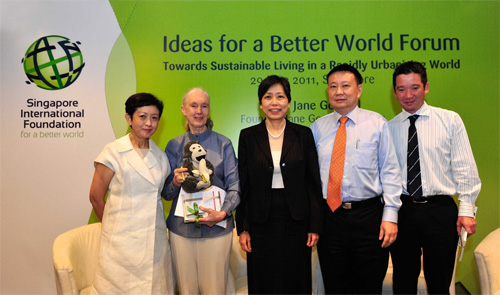Dr. Jane Goodall speaks about sustainability at the Singapore International Foundation’s Ideas for a Better World Forum.
Contributed By Yong Yung Shin

From left: Forum moderator and SIF governor Jennifer Lewis, Jane Goodall, SIF chairman Euleen Goh, Lee Tzu Yang and Howard Shaw. PHOTO COURTESY OF THE SINGAPORE INTERNATIONAL FOUNDATION
It was not a morning greeting attendees at the Singapore International Foundation’s Ideas for a Better World Forum were accustomed to. “It’s a sound which to me is very evocative of the African forests in Tanzania, where I and my team have been working for the past 50 years, learning about the chimpanzees ,” said Dr. Jane Goodall as she proceeded to imitate the chimpanzees and make a low hooting sound with her lips, eliciting laughter from the audience.
Goodall, an anthropologist and UN Messenger of Peace, is famous for her work in animal behavior, specifically that of chimpanzees. She was delivering the keynote address about sustainability at the Singapore International Foundation’s Ideas for a Better World Forum on the morning of June 29 at Fort Canning Centre. In attendance were dignitaries, heads of industry, students and members of the public.
Goodall’s love for the primates, fostered since young, has led her to campaign extensively against deforestation and for environmental conservation. Drawing from her years of experience and research, she emphasized the urgency for sustainable living: “A recent study indicates that if everyone in the world lived the life of an average American, we would need about five to six planets,” said Goodall. “Unfortunately, we only have one and that one is in trouble.” To hear Goodall say it, the human race is doomed unless it changes its ways. The biggest detractors to this school of thought are those who argue that the human ability to innovate will prevent the apocalypse so often predicted by doom-and-gloom environmentalists.
But whatever one believes in, there is no denying that Goodall is an inspirational figure. Born in Britain, between the two world wars, in a period where opportunities were not as plentiful as they are now for females, Goodall followed through with her love of animals by saving up enough money by waitressing to get to Africa and working under the late paleontologist Louis Leakey.
When she first got to the Gombe Stream National Park, the chimps ran away from her. “They had never seen a ‘white ape’ before, and that’s what we are to them,” she recalled with self-deprecating humor. Her discoveries eventually led to a revolution of man’s understanding of the most intelligent of the great apes, and opened doors to funding from National Geographic.
Goodall then shared about Roots and Shoots, a global volunteer program she founded that promotes sustainable living at the young. It began in Tanzania with 12 high school students aged 17 and 18, who wanted to embark on socially-conscious work to improve their surroundings. Today, Roots and Shoots exists in 127 countries.
Goodall also stated her support for Singapore’s proposed Green Corridor, a 40km walkway which was once the KTM railway, which would allow animals to move between the north and south of Singapore.
The morning session ended with a panel discussion on sustainable living in a rapidly urbanizing world comprising Goodall, Lee Tzu Yang, the chairman of Shell Groups in Singapore and Howard Shaw, senior vice-president of Corporate Social Responsibility at Halcyon.
